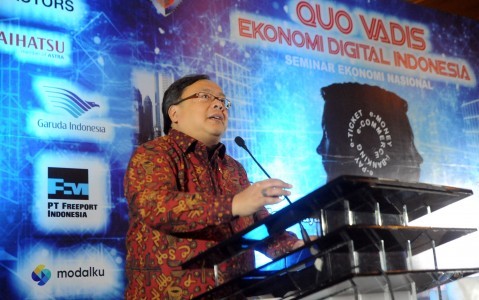Popular Reads
Top Results
Can't find what you're looking for?
View all search resultsPopular Reads
Top Results
Can't find what you're looking for?
View all search resultsGovt gears up for SDGs voluntary report
Change text size
Gift Premium Articles
to Anyone
T
he government is scheduled to showcase the progress it has made in achieving its Sustainable Development Goals (SDGs) at the United Nations’ High Level Political Forum in July.
It has been two years since Indonesia brought its first voluntary national reviews (VNRs) before the supranational body.
The VNRs aim to facilitate the sharing of experiences, including successes, challenges and lessons learned, with a view to accelerating the implementation of the 2030 agenda.
They also seek to strengthen policies and institutions of governments and to mobilize multi-stakeholder support and partnerships for the implementation of the SDGs.
Indonesia’s new VNRs would focus on the realization of the previous report, which put an emphasis on seven of the 17 SDGs, said Bambang Brodjonegoro, the head of National Development Planning Agency (Bappenas). The seven points are industry, innovation and infrastructure, poverty, hunger, health, gender equality, life below water, and partnerships to achieve the goals.
The new VNRs will highlight Presidential Regulation No. 59/2017 on the achievement of SDGs, which was issued in July 2017 following Indonesia’s first report. The regulation, said Bambang, was derived from national and local action plans.
“The national action plan has been completed, whereas around half of the provincial governments in Indonesia have completed their respective local action plans,” Bambang told reporters on the sidelines of a recent SDGs event. “We will also notify [the UN] of the increasing participation of non-government SDGs actors over the past two years.”
In its attempt to involve more non-government actors, Bappenas, along with the Indonesian headquarters of the UN Development Programme (UNDP), has inaugurated a national platform on SDGs for academics representing 50 universities across the archipelago.
Prior to the platform’s launch, several universities initiated their own SDGs centers, such as Padjadjaran University in West Java, Jember University in East Java and Bengkulu University in Bengkulu. The Bandung Institute of Technology (ITB) and the Bogor Institute of Agriculture (IPB) in West Java, said Bambang, would also launch their own SDGs in the coming months.
“These universities have been actively helping regional and central authorities to realize the SDG action plans [...] they have also been mainstreaming SDGs into college curriculum and thus the general public,” he added.
The UNDP’s country director for Indonesia, Cristophe Bahuet, lauded Indonesia’s progress with regards to the SDGs, saying that the country had shown significant commitment in adopting and implementing them through the 2017 presidential regulation.
“We are delighted to acknowledge our sub-national partnerships in three provinces, which are Riau, Lampung and Gorontalo [...] and ensuring alignment and adoption of SDG indicators to the mid-term regional development plan [RPJMD],” Bahuet said.
Universities and academics would accelerate research and innovations in the country that were needed to achieve the goals, he said, adding that the national platform would help bring experts together to speed up the process.
In order to support the development of innovations, the UNDP had opened an innovative financing lab several months ago, Bahuet said. The lab would help the experts find new approaches and mechanisms in SDG financing, including blended finance, blue and green bonds as well as green sukuk.
The lab, he said, also offered financial solutions for philanthropists and private funds wanting to be involved in the SDGs.
In October last year, the Finance Ministry appointed government-backed infrastructure financing company PT Sarana Multi Infrastruktur (SMI) as the financial hub for the SDGs. SMI gathers and arranges budgets for public facilities to become more focused on projects embedded in the 17 objectives of the SDGs.
The company is expected to be given US$18 billion to finance hundreds of SDG-related projects with no fixed deadline.
It has also identified 31 projects that will be offered blended financing worth around $4 billion this year. Blended financing is a mix of funds from the private sector or philanthropists.










